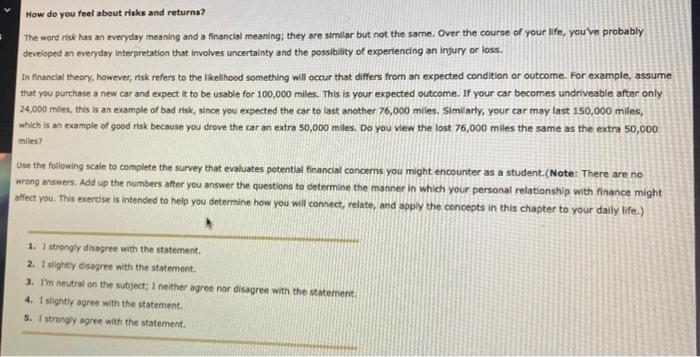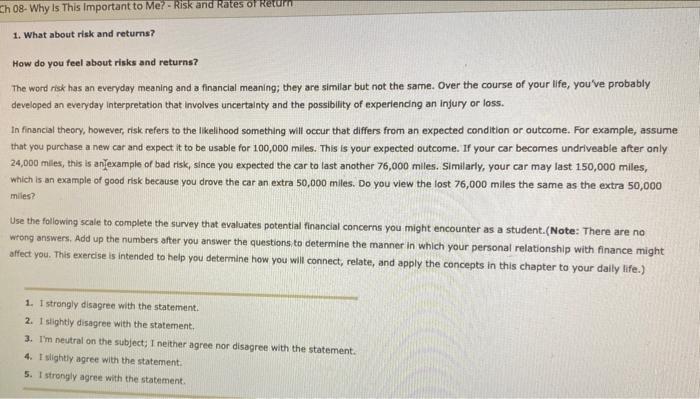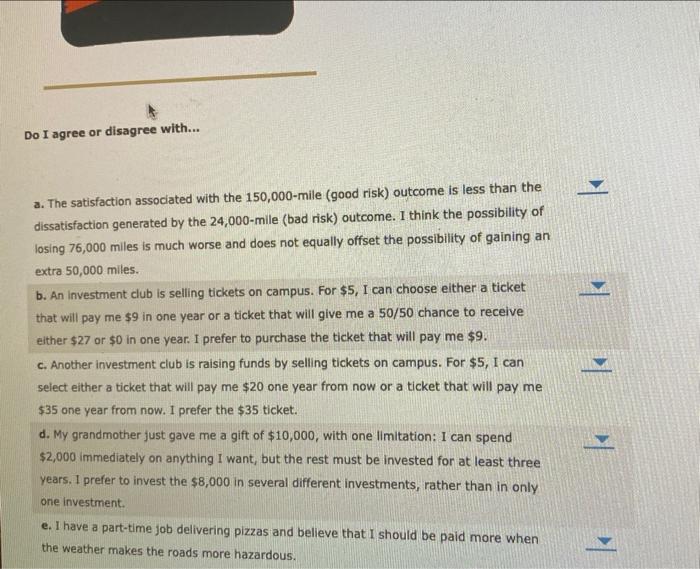How do you feel about risks and returns? The word risk has an everyday meaning and a financial meaning; they are similar but not the same. Over the course of your life, you've probably developed an everyday interpretation that involves uncertainty and the possibility of experiencing an injury or loss. In financial theory, however, risk refers to the likelihood something will occur that differs from an expected condition or outcome. For example, assume that you purchase a new car and expect it to be usable for 100,000 miles. This is your expected outcome. If your car becomes undriveable after only 24,000 miles, this is an example of bad risk, since you expected the car to last another 76,000 miles. Similarly, your car may last 150,000 miles, which is an example of good risk because you drove the car an extra 50,000 miles. Do you view the lost 76,000 miles the same as the extra 50,000 miles? Use the following scale to complete the survey that evaluates potential financial concerns you might encounter as a student.(Note: There are no wrong answers. Add up the numbers after you answer the questions to determine the manner in which your personal relationship with finance might affect you. This exerdse is intended to help you determine how you will connect, relate, and apply the concepts in this chapter to your daily life.) 1. I strongly disagree with the statement 2. I slightly disagree with the statement 3. I'm neutral on the subject; neither agree no disagree with the statement 4. I slightly agree with the statement. 5. I strongly agree with the statement. Ch 08- Why Is This Important to Me? - Risk and Rates of Return 1. What about risk and returns? How do you feel about risks and returns? The word risk has an everyday meaning and a financial meaning; they are similar but not the same. Over the course of your life, you've probably developed an everyday Interpretation that involves uncertainty and the possibility of experiencing an injury or loss. In financial theory, however, risk refers to the likelihood something will occur that differs from an expected condition or outcome. For example, assume that you purchase a new car and expect it to be usable for 100,000 miles. This is your expected outcome. If your car becomes undriveable after only 24,000 miles, this is an example of bad risk, since you expected the car to last another 76,000 miles. Similarly, your car may last 150,000 miles, which is an example of good risk because you drove the car an extra 50,000 miles. Do you view the lost 76,000 miles the same as the extra 50,000 miles? Use the following scale to complete the survey that evaluates potential financial concerns you might encounter as a student. (Note: There are no wrong answers, Add up the numbers after you answer the questions to determine the manner in which your personal relationship with finance might affect you. This exercise is intended to help you determine how you will connect, relate, and apply the concepts in this chapter to your daily life.) 1. I strongly disagree with the statement. 2. I slightly disagree with the statement 3. I'm neutral on the subject; I neither agree nor disagree with the statement 4. I slightly agree with the statement 5. I strongly agree with the statement, Do I agree or disagree with... lo a. The satisfaction associated with the 150,000-mile (good risk) outcome is less than the dissatisfaction generated by the 24,000-mile (bad risk) outcome. I think the possibility of losing 76,000 miles is much worse and does not equally offset the possibility of gaining an extra 50,000 miles. b. An investment club is selling tickets on campus. For $5, I can choose either a ticket that will pay me $9 in one year or a ticket that will give me a 50/50 chance to receive either $27 or $0 in one year. I prefer to purchase the ticket that will pay me $9. c. Another investment club is raising funds by selling tickets on campus. For $5, I can select either a ticket that will pay me $20 one year from now or a ticket that will pay me $35 one year from now. I prefer the $35 ticket. d. My grandmother just gave me a gift of $10,000, with one limitation: I can spend $2,000 immediately on anything I want, but the rest must be invested for at least three years. I prefer to invest the $8,000 in several different investments, rather than in only one investment. e. I have a part-time job delivering pizzas and believe that I should be paid more when the weather makes the roads more hazardous. lo









